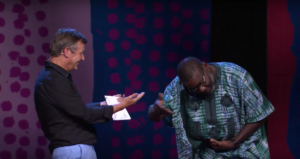I wager that this critique about my muse might still have some validity today. I am often accused of not writing for the common man because I write about ‘lofty’ ideas that fly above the heads of ordinary readers. Three decades ago, I was particularly stung by this critique, even as I persisted in writing about the world around me in the way I experienced it. As a young writer I was always forced to almost apologize for my style. Well…no more. These days, I write for ‘uncommon’ people with no apologies, even if my heart lies with common people. You might say I have a DIGITAL mind and an ANALOG heart.
– Tunji Lardner
In writing this weekly column, I have consciously refrained from making head-on political commentaries. Maybe it is because I consider myself mis-informed enough, not to be able to. But this is not to obliquely suggest that I am apolitical, no man can be, especially in these rabidly politicized times. Nor is it to insinuate that I am totally unaffected by all this political madness’ only the genuinely mad is mercifully insulated.
True, I am personally disgusted with the absurdities and mediocrity of Nigerian politics, but that (not withstanding) does not make me as apathetic as some of my professional colleagues might think.
Recently, some of my colleagues accused me of sitting on the fence (a very high one at that), with my head enveloped in cumulus clouds; almost totally out of touch with the fiery politicking going on below.
I should, they argued, be writing strongly about our democracy and the blatant mis-use of it, instead of writing about vague and abstract things like “Hope and Hopelessness” (last week’s article). “I should make my stand very clear now, because as things are now, nobody can afford to be indifferent (most especially a working journalist) about the way certain individuals are toying with this nation.”
What is more, as the whole nation seems to be tottering towards a totalitarian government; it was ethically and professionally imperative upon me as a columnist to contribute squarely and incisively to the debate raging on about which way this beautiful country was heading (if it’s heading anywhere at all). As to the question which way the country is heading, the general consensus among the enlightened seems to be that it is heading for the bogs (a colloquialism for the septic tank).
But more relevantly, in answering to my colleagues (and no doubt some readers) who think that I am not involved enough in the debate; I say that I stand, where I sit, on the fence.Sitting on the high fence, at once elevates me above the inherent pettiness and boisterousness that usually plagues such debates.
And the high rarefied perch of my fence, affords me a panoramic view of people, places, and events.Admittedly, as a minor concession, sitting on a fence is inherently detached, if not escapist. But commentary, in an atmosphere that is increasingly beclouded by ethnicity, egotism, avarice, and fear, requires an almost physical disengagement, if any degree of objectivity is to be achieved. This is not to disregard the sensuous importance of physical contact with issues that no doubt make for textured analysis. But “mixing it thick” with the banalities of national issues, personalities and events, tends to suck in and reduce any objectivity to the myopic and the pedestrian.
Commentaries, once mired, become emotionally charged, and the commentator, (like most in this country) sub-consciously shifts focus, and sits dogmatically on the EFFECTS and not the CAUSES, instead of ideally on the causes and effects.
The more intangible effects of a blotched election can easily be perceived as that ever tightening band of tension and suspicion that seems to be constricting the nation. The repercussions of manipulated general elections, is the death, destruction and protests echoing from most parts of this country. It would be naïve of anyone to think that the question of “rigging”, during these elections was limited to one or two of the political parties that contested. All the parties, I am sure, were guilty of electoral malpractices, though in varying degrees and sophistication.
But to ascertain the primary causes of these effects, will require a detailed socio – historical excursion into the pre-colonial politics of this country. And as mentioned before, I consider myself mis-informed enough not to be able to comment authoritatively on this.
But as we move from the remote causes, to the more palpable immediate ones, it becomes hard to be optimistic about this country and its turbulence.
The state of the nation’s economy is by itself enough to throw anyone into paroxyms of rage and despair. The cause being the accumulative effects of mismanagement, short-sightedness, and bad planning by successive governments both civilian and military alike. The situation has been compounded by the Shagari Administration, which doesn’t seem to have any genuine desire to effect a positive change. They are quite competent (as the elections have shown) at gaining political power (by whatever means necessary) but are at sea when it comes to using such powers for the benefit of all.
It’s arguable, that the underlying reason why there is mounting disconcertion and protests over the election results is not necessarily because people were deviously disenfranchised, but more because of the nightmarish portends of another four-years Shagari – austerity administration along with its usual accoutrements of bloated egos, blatant corruption and, of course, “rosy cheeks.”
Another cause is the grim resoluteness of some politicians to be “King” at whatever cost, including triggering off violence in one instance, and utilizing the force of the state in another. Violence is meaningful only when reason has failed and violence is purposeful only when directed at its root causes.
This is not to justify violence (which is always avoidable) but to redirect opinions to its causes (in this instance) and not its effects, which we all know so well.
So N.P.N.’s Uba Ahmed (arrogating to himself the federal might) can convene as many world press conferences as he pleases and expose the U.P.N.’s diabolical plans to destabilize the country with their Secret Armies.
And Governor Bisi Onabanjo, can convene another world press conference to speak in defense of the U.P.N.’s army.
But both wittingly and unwittingly, provide an excellent diversion from the answer to the fundamental question of qualitative leadership which has thus far eluded us as a nation.
And from my fence, I can see Nigerians scurrying around, sometimes caring about the destiny and well being of their country, but most times caring only about their stomachs. One day they will simultaneously have an idea, a direction, and they will all march in unison towards that direction.And to the reactionary; I say no army can withstand an idea whose time has come.
Tunji Lardner
The Punch, September 1983



